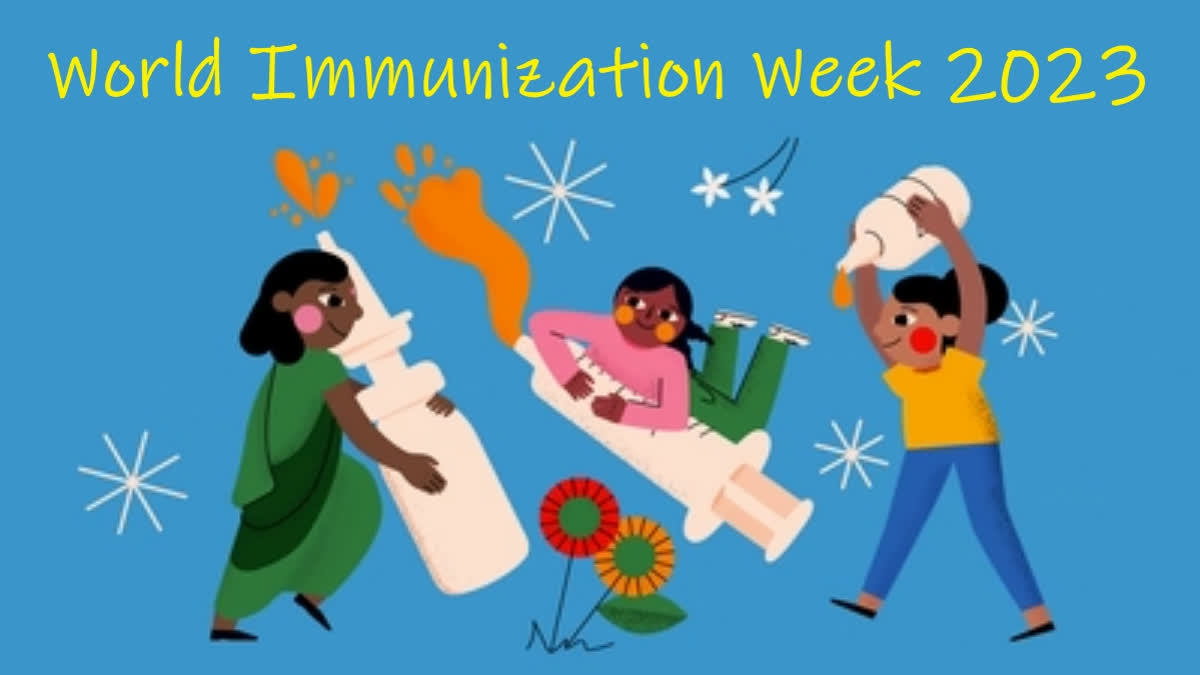Hyderabad: Vaccinations are essential to prevent diseases or infections in everyone. Vaccination was an important factor in curbing a pandemic like Covid-19. Despite this, the number of people getting vaccinated, be it newborns or adults, is not 100 per cent. The Observance of World Immunization Week every year during the last week of April provides the general public with an opportunity to gain information about the importance of vaccines and the need to get them applied.
For the decreasing percentage of vaccinations among people, reasons such as lack of awareness, fear of vaccines, and unavailability of vaccines can be held responsible. World Immunization Week is observed in the last week of April every year, and in 2023, this week is observed from April 24 to April 30.
According to UNICEF, around 20 million children around the world do not get vaccinated due to various reasons, and as a result, a large number of lives are lost every year. Not just this, even during the prevention of Covid-19, when getting vaccinated was considered essential a large number of people were reluctant, confused and afraid of getting vaccinated.
Vaccines play an important role in the prevention of many diseases and infections. But despite this, many people, especially children, are not able to get the necessary vaccines due to various reasons. In the year 2023, this event is being observed around the theme "The Big Catch-up" from 24 to 30 April.
Many types of vaccines are given to newborn children to protect them from many deadly diseases. Also, the administration of vaccines is advised to adults to prevent the occurrence of several deadly diseases. Despite knowing the benefits of vaccines, hesitation or fear about vaccines is commonly noticed in a large number of people. During World Immunization Week, awareness campaigns are organized by the World Health Organization in collaboration with various international and local groups to protect people against diseases that are vaccine-preventable and reduce fear among the general public.
In 2023, the World Immunization Week 2023 activities by the World Health Organization are focused on “assisting governments to provide the necessary technical support and necessary information to launch effective Immunization programmes, and to emphasize the importance of vaccines and Immunization”, thereby to save as many people as possible, especially children, from preventable diseases.
A national program for vaccination was organised for the first time in the year 1960. Due to this, countries that have had high rates of neonatal vaccination have significantly reduced the death rate of children under the age of five from diseases or infections that are preventable by vaccines.
Currently, due to all the national and international efforts, there is increasing awareness about the need for vaccinations among people, especially newborns all around the world. The Government of India has also launched Universal Immunization Program, Intensified Mission Indradhanush (IMI 3.0), and Pulse Polio Program, to promote vaccination.
Vaccination is done to prevent infectious diseases caused by viruses or bacteria. Diseases or infections that can be prevented through vaccination are known as vaccine-preventable diseases or VPDs. many VPDs are still considered one of the leading causes of death in children under the age of five.
According to the World Health Organization, between the year 2019 and the year 2021, the number of children who have not been vaccinated globally has increased by about 5 million. Whereas in the year 2022, 35 lakh girls could not be vaccinated against human papillomavirus as compared to 2019. One of the biggest reasons for this can be attributed to the lack of awareness among the general public.
According to doctors, having the right vaccination at the right time can not just reduce morbidity and mortality in children but also in adults, as well as improve their quality of life. It is worth noting that vaccination can be very helpful in curbing many other infectious diseases including VPD in children and adults like polio, diphtheria, tetanus, Covid-19, etc. “World Immunization Week” allows health services and other related organizations to make efforts to spread awareness among the general public about the need for timely vaccination and its safety parameters.



